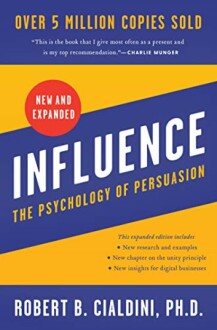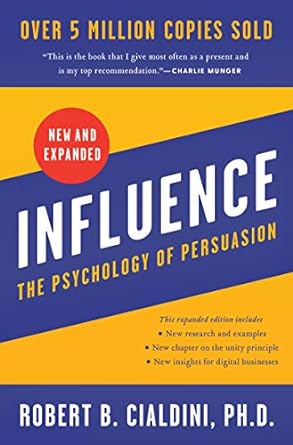Unleash the Power of Persuasion with Influence: A Review
Key Takeaways:
- This book explores the six universal principles of influence that drive human behavior.
- Learn how to apply these principles to your copywriting, marketing, and sales strategies.
- Discover how to build trust, establish rapport, and create a sense of urgency with your audience.
Imagine being able to effortlessly persuade others to take action, whether it's buying a product, signing up for a service, or supporting a cause. Sounds like a dream come true, right? Well, what if I told you that it's not just a skill reserved for salespeople and marketers, but a science-backed strategy that anyone can master? Enter "Influence: The Psychology of Persuasion" by Robert B. Cialdini, Ph.D.
About Influence: The Psychology of Persuasion

"Influence: The Psychology of Persuasion" is a seminal work by Robert B. Cialdini, Ph.D., a renowned expert in the field of psychology and persuasion. This book is a must-read for anyone looking to understand the underlying principles that drive human behavior and how to apply them to their copywriting, marketing, and sales strategies.
Understanding the Six Principles of Influence
The book explores the six universal principles of influence that drive human behavior, including reciprocity, commitment and consistency, social proof, authority, liking, and scarcity. These principles are backed by scientific research and provide a framework for understanding why people make the decisions they do.
| Feature | Description |
|---|---|
| Reciprocity | The principle of reciprocity states that people feel a sense of obligation to return a favor or reward. This principle is often used in marketing and sales to create a sense of mutual benefit. |
| Commitment and Consistency | This principle suggests that people tend to behave consistently with their previous commitments. This principle is often used in copywriting to create a sense of urgency and scarcity. |
| Social Proof | The principle of social proof states that people are more likely to adopt a behavior if they see others doing it. This principle is often used in marketing and sales to create a sense of social validation. |
| Authority | The principle of authority suggests that people tend to follow the advice or guidance of experts or authorities. This principle is often used in copywriting to create a sense of credibility and trust. |
| Liking | The principle of liking states that people are more likely to do business with people they like or have a rapport with. This principle is often used in copywriting to create a sense of connection and rapport with the audience. |
| Scarcity | The principle of scarcity suggests that people are more likely to act if they believe that the opportunity or resource is scarce. This principle is often used in copywriting to create a sense of urgency and limited time offers. |
Key Takeaways for Copywriters and Marketers
The book provides a wealth of insights and strategies for copywriters and marketers looking to create more effective copy. Some key takeaways include:
- How to use the principles of influence to create a sense of urgency and scarcity.
- How to build trust and establish rapport with your audience.
- How to use social proof to create a sense of social validation.
- How to use authority and expertise to create a sense of credibility and trust.
- How to use liking and rapport to create a sense of connection with your audience.
Mastering the Art of Persuasion: Weighing the Pros and Cons
Pros
- The book provides a comprehensive understanding of the six universal principles of influence that drive human behavior, making it an invaluable resource for copywriters, marketers, and salespeople.
- The principles are backed by scientific research, giving readers a solid foundation for understanding and applying the strategies.
- The book offers a range of practical strategies and techniques that can be applied to various contexts, from sales and marketing to personal relationships and negotiations.
- The principles of influence can be used to build trust, establish rapport, and create a sense of urgency with your audience.
- The book is well-researched and engagingly written, making it an enjoyable and informative read.
Cons
- The book may be overwhelming for readers who are new to the concepts of influence and persuasion, as it covers a wide range of topics and principles.
- Some readers may find the scientific research and data-heavy sections dry or difficult to follow.
- The book may not provide a step-by-step guide for implementing the principles of influence, leaving readers to figure out how to apply them in their own work.
In conclusion, while "Influence: The Psychology of Persuasion" may have some drawbacks, its comprehensive coverage of the six universal principles of influence and its well-researched, engaging writing style make it a valuable resource for anyone looking to master the art of persuasion. With its practical strategies and techniques, this book is sure to be a game-changer for copywriters, marketers, and salespeople looking to take their skills to the next level.
Unlocking the Secrets to Effective Copywriting: Tips and Insights
Tips for Buyers:
- When purchasing similar products, look for books that offer a comprehensive understanding of the principles of influence.
- Avoid books that focus solely on theoretical concepts without providing practical strategies and techniques.
- Consider books that offer a range of perspectives and insights from experts in the field.
In conclusion, "Influence: The Psychology of Persuasion" is a must-read for anyone looking to master the art of persuasion. With its comprehensive coverage of the six universal principles of influence, this book provides a solid foundation for understanding and applying the strategies. While it may have some drawbacks, its well-researched, engaging writing style and practical strategies make it a valuable resource for copywriters, marketers, and salespeople. By applying the principles of influence, you can create a sense of urgency, build trust, and establish rapport with your audience, ultimately driving results and achieving your goals.
Check Current PriceUnlocking the Secrets to Effective Copywriting: Your Most Pressing Questions Answered
-
Q: How can I apply the principles of influence to my copywriting?
A: Applying the principles of influence to your copywriting involves understanding the six universal principles of influence and how to use them to create a sense of urgency, build trust, and establish rapport with your audience. This book provides a comprehensive guide on how to do just that.
-
Q: Can I use the principles of influence in my personal relationships, or are they only applicable to sales and marketing?
A: The principles of influence are not limited to sales and marketing. They can be applied in various contexts, including personal relationships, negotiations, and even everyday conversations. By understanding how people make decisions, you can improve your relationships and build stronger connections with others.
-
Q: How can I use social proof to create a sense of social validation?
A: Social proof can be used in a variety of ways, including showcasing customer testimonials, reviews, and ratings. By highlighting the successes of others, you can create a sense of social validation and increase the likelihood of people taking action.
-
Q: Can I use the principles of influence to build trust with my audience?
A: Yes, the principles of influence can be used to build trust with your audience. By establishing rapport, creating a sense of urgency, and using social proof, you can build trust and increase the likelihood of people taking action.
-
Q: How can I use the principles of influence in my content marketing strategy?
A: The principles of influence can be used in a variety of content marketing strategies, including blog posts, social media, and email marketing. By understanding how people make decisions, you can create content that resonates with your audience and drives results.
-
Q: Can I use the principles of influence to create a sense of scarcity?
A: Yes, the principles of influence can be used to create a sense of scarcity. By highlighting the limited availability of a product or service, you can create a sense of urgency and increase the likelihood of people taking action.










